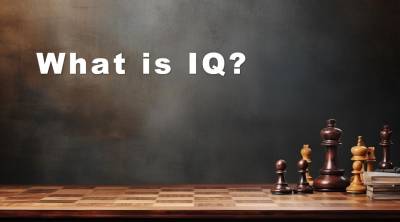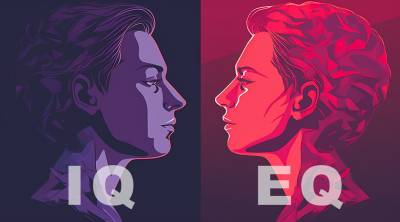Difference between IQ, EQ, AQ, and SQ

Intelligence is a multifaceted concept, extending far beyond mere cognitive abilities. Traditionally measured by the Intelligence Quotient (IQ), the understanding of intelligence has expanded to include Emotional Quotient (EQ), Adversity Quotient (AQ), and Social Quotient (SQ). Each of these quotients offers a unique perspective on an individual's capabilities and adaptability in various aspects of life.
Intelligence Quotient (IQ)
Definition: IQ is a measure of a person's cognitive abilities and their ability to solve problems and understand complex ideas.
Key Characteristics:
- Problem-solving skills
- Logical reasoning
- Abstract thinking
Comparative Analysis of IQ Levels
| IQ Range | Classification |
|---|---|
| Above 130 | Very Superior |
| 120 - 129 | Superior |
| 90 - 109 | Average |
| 70 - 89 | Below Average |
| Below 70 | Extremely Low |
Emotional Quotient (EQ)
Definition: EQ measures an individual's ability to perceive, control, and evaluate emotions – both their own and those of others.
Key Characteristics:
- Self-awareness
- Emotional regulation
- Empathy
Key Aspects of EQ
| Component | Description |
|---|---|
| Self-Awareness | Understanding one's emotions |
| Self-Regulation | Managing emotions |
| Social Skills | Interacting harmoniously with others |
| Empathy | Understanding others' emotions |
| Motivation | Personal drive to improve |
Adversity Quotient (AQ)
Definition: AQ reflects a person's ability to endure and thrive in the face of challenging and adverse situations.
Key Characteristics:
- Resilience
- Stress management
- Perseverance
Elements of AQ
| Element | Impact |
|---|---|
| Control | Managing the influence of external factors |
| Ownership | Taking responsibility for facing challenges |
| Reach | Extent to which adversity affects life |
| Endurance | Persistence over time |
Social Quotient (SQ)
Definition: SQ measures an individual's ability to understand social cues and effectively navigate and influence social environments.
Key Characteristics:
- Social awareness
- Interpersonal skills
- Cultural understanding
Social Quotient Components
| Component | Function |
|---|---|
| Social Sensitivity | Reading social cues |
| Interpersonal Ability | Building social relationships |
| Social Influence | Impacting social groups |
Difference between IQ, EQ, AQ, and SQ
Here's a table that compares and contrasts IQ, EQ, AQ, and SQ, providing a clear overview of each quotient's unique characteristics:
Comparative Table of IQ, EQ, AQ, and SQ
| Quotient | Definition | Key Characteristics | Primary Focus |
|---|---|---|---|
| IQ (Intelligence Quotient) | Measures cognitive abilities like problem-solving and reasoning | Logical reasoning, abstract thinking, analytical skills | Cognitive processing and intellectual abilities |
| EQ (Emotional Quotient) | Assesses emotional intelligence, including self-awareness and emotional control | Empathy, self-regulation, social skills | Understanding and managing emotions in oneself and others |
| AQ (Adversity Quotient) | Evaluates the ability to withstand and overcome adverse situations | Resilience, stress management, perseverance | Coping with challenges and resilience in the face of adversity |
| SQ (Social Quotient) | Determines social awareness and ability to navigate social environments | Interpersonal skills, social sensitivity, cultural awareness | Interacting effectively in social contexts and understanding social dynamics |
These different quotients, when combined, provide a comprehensive picture of an individual's overall intelligence and adaptability. While IQ can predict academic and professional success, EQ, AQ, and SQ are equally important in determining how well an individual will interact with others, handle stress, and adapt to social changes.
The interplay between these quotients is crucial in personal and professional development. While a high IQ can open doors to academic and career opportunities, EQ, AQ, and SQ often determine how well one navigates through those opportunities.
In conclusion, understanding IQ, EQ, AQ, and SQ offers a holistic view of intelligence, emphasizing that success and personal fulfillment depend on a balance of cognitive abilities and emotional, social, and adversity-related skills. This comprehensive approach to intelligence encourages us to develop ourselves in all these areas to thrive in a complex and ever-changing world.





